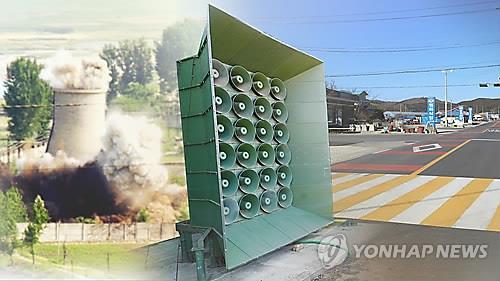South Korea plans to double the number of anti-North Korean loudspeaker stations along the inter-Korean border in retaliation for the communist country's recent series of ballistic missile provocations, military officials said Wednesday.
"We plan to add some 10 new anti-North loudspeaker broadcast facilities by the end of the year," a military official said.
Currently, the military operates 11 static loudspeaker stations along the border to broadcast messages critical of North Korea's Kim Jong-un regime and the reclusive socialist system in a psychological warfare strategy aimed at mounting pressure on the North.
The expansion plan will drive the number of border stations up to more than 20, with the latest additions to have better performance so the messages they send can be heard more than 10 kilometers away.
Seoul last resumed the old tactic last year after North Korea wounded two South Korean soldiers in a land mine attack near the tense inter-Korean border in August. The rival Koreas had previously stopped the border psychological operations in a mutual agreement in June 2004.
As part of the upcoming expansion, the military will also introduce about six more mobile loudspeaker systems on top of the six that are currently in operation, an official source said.
He added that the plan is meant as retaliation for North Korea's continuing nuclear and missile provocations, including the launch of two Musudan intermediate-range ballistic missiles in late June.
"It also aims to correctly inform the North Korean military and people of the reality that the Kim regime is misleading its people and hurting the economy by engaging in the dual policy of seeking nuclear and economic development at the same time," the official said. Many experts in Seoul said that the two-pronged policy of simultaneously building atomic arms and boosting the economy is not realistic and likely to fail.
In January, North Korea conducted its fourth nuclear test in defiance of the international community, resulting in the adoption of the toughest-ever resolution by the United Nations Security Council.
In February, the country again conducted what outsiders labeled a test of intercontinental ballistic missile technology, followed by a series of test-launches of submarine launched ballistic missiles, multiple-launch rocket systems and IRBMs capable of reaching as far as the U.S. territory of Guam. (Yonhap)






![[KH Explains] No more 'Michael' at Kakao Games](http://res.heraldm.com/phpwas/restmb_idxmake.php?idx=645&simg=/content/image/2024/04/28/20240428050183_0.jpg&u=20240428180321)